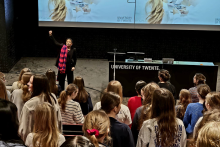'The higher the academic positions, the less women there are. Only 17% of professors are female in the Netherlands. It seems to be harder for women to get higher positions, but it’s not impossible to succeed. That is why we wanted to learn the keys to success from the male and female perspective, to find out if men face the same challenges,' said Sonia Garcia Blanco, an associate professor of Optical Sciences, as she introduced the main speaker, Alexander Brinkman.
More team work
Professor Brinkman is the chair of the Quantum Transport in Matter, he has received several prestigious grants and was the member of the Young Academy of the Royal Dutch Academy of Science. Despite his challenging work, he manages to spend a plenty of time with his two young children. So how does he do it?
'Is it possible to be a part-time scientist?' began Brinkman. 'Once you have kids, you move from working 60 hours a week to working 30 hours. To do that, I had to become more efficient and focus only on a few things that I’m good at. I learnt to say no to some job tasks. However, it can be very difficult to keep up with all the literature, you can lose the overall grasp. In my field, the main competition comes from China, where people just keep on working 60 hours a week. For this reason, not everyone in the Netherlands could probably work only 30 hours a week, but we could perhaps improve our team work, focus on team rewarding, rather than individuals.'
Too high criteria of excellence
Brinkman himself works about four days a week in order to also spend time with his family. How do people around him react to this work arrangement and would this reaction be any different if a woman did the same? 'I notice difference between generations, rather than genders. The older generation might complain that I don´t work every day, but my younger colleagues do the same and find it normal,' answered Brinkman. 'The issue is in how we define excellence and success. Maybe we shouldn´t focus only on the amount of publications.'
Sonia Garcia Blanco agrees: 'Current standards can be too high. You can often achieve them only if you work 60 hours a week. The system should change and we should judge work differently, based on a realistic work schedule.'
More lunch debates to come
Today´s FFNT lunch discussion wasn´t a one-time event. Similar debates and lectures will take place in the upcoming months.







